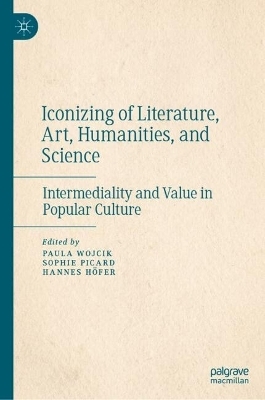
Iconizing of Literature, Art, Humanities, and Science.
Springer International Publishing (Verlag)
978-3-031-62311-0 (ISBN)
- Noch nicht erschienen - erscheint am 24.11.2024
- Versandkostenfrei innerhalb Deutschlands
- Auch auf Rechnung
- Verfügbarkeit in der Filiale vor Ort prüfen
- Artikel merken
Why do people wear shirts with the Shakespeare quote "to be or not be?" or a portrait of philosopher Slavoj Zizek? How does popular and mass media adaptation and appropriation influence theoretical or literary concepts like 'deconstruction' or the 'Kafkaesque'? Why are Lolita, Leonardo Da Vinci's Mona Lisa, and Einstein ubiquitous and yet Leopold Bloom, Francisco de Goya's The Naked Maja, and Leó Szilárd are not? Our answer is simple: because some works, persons, literary characters, pieces of music, or even theoretical concepts are cultural icons. Cultivated by expert and in popular culture they become representatives of what is considered to be outstanding or even a peak of human culture. As cultural icons they are venerated and sometimes desecrated in manifest or metaphorical iconoclasms. By exploring cultural icons and their role in popular culture, the contributions from the fields of theology, musicology, history, fine arts, linguistics, film studies, literary studies, media studies, and cultural studies provide a deeper understanding of the ways in which cultural meaning and value are created, communicated, and disseminated in our daily lives.
Paula Wojcik is Professor of World Literature at the University of Vienna.
Hannes Höfer is Director of the Goethe Society Weimar.
Sophie Picard is Research Associate Professor (maîtresse de conférences) at the department of German Studies at Aix-Marseille-University.
EDITORS.- Introduction:- Iconizing of Literature, Art, Humanities, and Science. Intermediality and Value in Popular Culture.- I Literature.- DANIEL SYROVY (UNIVERSITY OF VIENNA) On Not Knowing Homer: A Poet as Icon.- MARTINA STEMBERGER (UNIVERSITY OF VIENNA) Lolita, Oblomov & Co.: Figurations of Literary Iconicity Between Transfictionality, Transmediality, and Transculturality.- ALEXANDER LÖCK (FRIEDRICH-SCHILLER-UNIVERSITY JENA) Iconizing Literature as a Literary Theme.- IRENE HUSSER (UNIVERSITY OF MÜNSTER) Kafka goes TV. Franz Kafka and the Kafkaesque in Popular Television Series.- ACHIM HÖLTER (UNIVERSITY OF VIENNA) "Do you know these poets?" Literary History in the Quartet Games of the 19th and 20th Centuries.- JÉRÔME COTTIN (UNIVERSITY STRASBOURG) Biblical Symbolism in Advertisement: History, Context, and Related Controversies in Switzerland, Germany and France.- SOPHIE PICARD (AIX-MARSEILLE-UNIVERSITY To Meme or not to Meme. Literary Quotes and Memes in Digital Culture.- PAULA WOJCIK (UNIVERSITY OF VIENNA) Forms and Functions of Iconizing Literature. Authors, Works, Discourses.- II Art (fine arts, music, film, performative arts) ELISABETH FRITZ (FRIEDRICH-SCHILLER-UNIVERSITY JENA) Figures de modes. Watteau's fêtes galantes in Popular and Mass Culture in the 18th and 19th centuries.- UDO BOMNÜTER (DEKRA HOCHSCHULE FÜR MEDIEN) "That Giggling, Dirty-Minded Creature" - The Re-Creation of an Iconic Figure in Forman's Film Adaptation of Amadeus (1984/2002).- STEPHANIE GROßMANN (UNIVERSITY OF PASSAU) "Advertising is the art of aiming at the head and hitting the wallet." (Vance Packard)How Blindly Do Commercials Shoot Cupid's Arrows?.- BIRGER PETERSEN (JOHANNES GUTENBERG UNIVERSITY MAINZ) Counterpoint as Icon. Music and Intertextuality in the Late 19th Century.- ANNA-SOPHIE JÜRGENS (NATIONAL UNIVERSITY CANBERRA) Intermedia Genealogy and Interrelation of Icons: Clowns, Robots and the Joker.- THOMAS SCHOLZ (UNIVERSITY OF ST. LOUIS) The Un-Reality of Quoted Icons: Reduced Representativity in Ludic World-Building.- III Science and Humanities NIKOLAI MÜNCH (JOHANNES GUTENBERG UNIVERSITY MAINZ), PAULA WOJCIK (UNIVERSITY OF VIENNA).- Science in Popular Culture. Dolly the Sheep is gone but not forgotten.- NADJA GERNALZICK (UNIVERSITY OF VIENNA/ JOHANNES GUTENBERG UNIVERSITY MAINZ) Deconstruction under Self-Deconstruction? On the De-Iconization of a Critical Term.- KATHARINA TYRAN (UNIVERSITY OF VIENNA) Script as a Cultural Icon: The Example of Glagolitic as a Representation of Croatia's National Identity.- HANNES HÖFER (FRIEDRICH-SCHILLER-UNIVERSITY JENA) Production of Icons: Hans Ulrich Gumbrecht's Production of Presence and Hermeneutics.- STEFAN ALKER-WINDBICHLER (UNIVERSITY OF VIENNA) A Kind of Paradise. The Library as a Cultural Icon.- INDICE (Exception A: The published book will contain an index, but it is not ready to be submitted with the proposal).
| Erscheinungsdatum | 10.09.2024 |
|---|---|
| Zusatzinfo | Approx. 335 p. 20 illus. |
| Verlagsort | Cham |
| Sprache | englisch |
| Maße | 155 x 235 mm |
| Themenwelt | Sozialwissenschaften ► Kommunikation / Medien ► Kommunikationswissenschaft |
| Sozialwissenschaften ► Kommunikation / Medien ► Medienwissenschaft | |
| Schlagworte | Adaptation • cultural icon • Cultural icons • Cultural transfer • iconicity • Intermedia • open access • Pop culture • Transculturality • Transmedia |
| ISBN-10 | 3-031-62311-8 / 3031623118 |
| ISBN-13 | 978-3-031-62311-0 / 9783031623110 |
| Zustand | Neuware |
| Haben Sie eine Frage zum Produkt? |
aus dem Bereich


